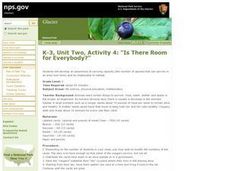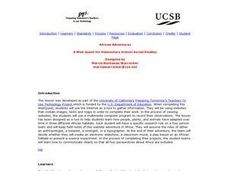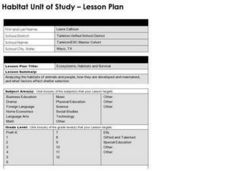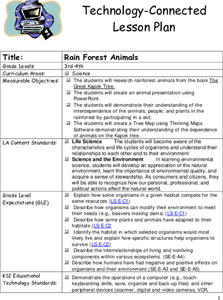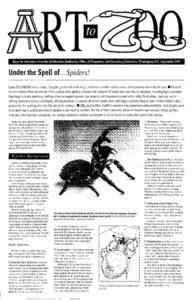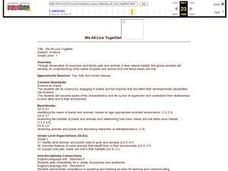Curated OER
Animal Habitats: 1st Grade
Learning about animal habitats can be a lot of fun. This lesson focuses on how God created different habitats to suit different animal needs. Students will conduct library research in order to create a five page habitat slide show using...
Curated OER
I spy (Camouflaged Animals in Art!)
Students create a picture of a camouflaged animal in its habitat. In this visual arts lesson, students look at Hans Hoffmann's painting A Hare in the Forest and discuss the animal's camouflage. They research their own animal to...
Curated OER
Animal and People Habitats
Students examine how animals create a unique space in which they can live. Students read a poem about animals' habitats discuss the habitats. They draw a space of their own and write a poem that describes their habitat.
ARKive
Adaptations for Movement
What animals are best suited for moving around a rainforest, or a desert? Design your own animal species based on a particular habitat, focusing on the characteristics it will need for optimal movement. Great as a group lesson or...
Curated OER
Animal Habitats
Students explore animal lifestyles by researching their characteristics. In this animal habitat lesson, students read the story Over in the Jungle and analyze the animal illustrations in the book. Students create clay animal characters...
Curated OER
Wildlife Burrows
Burrowing animals are busy! Get your middle school ecologists busy as well by having them create a scale model of a burrowing population. They also design a PowerPoint or poster to explain their models.
Montana State University
Everest Extremes: Biodiversity
How many animals can live in a climate as cold as Mount Everest's? Find out with a science lesson all about biodiversity. Activities include research, presentations, group work, coloring maps, and a simulation of a food web.
Curated OER
Is There Room for Everybody?
Third graders examine the capacity of animals able to live in one habitat. For this habitat lesson, 3rd graders play a game that shows the food chain and the interactions between animals in an area. Students discover that food is a major...
Staten Island Zoo
The African Savanna
Are you thinking about taking your class to the local zoo? Kids of all ages love visiting exotic animals in order to learn about biodiversity, habitat, and animal adaptations. Here is a 44-page activity guide that provides educators with...
Curated OER
What's That Habitat?
Fourth graders explore the environment by researching animal characteristics. In this habitat identification lesson, 4th graders utilize paper and crayons to illustrate their own habitats or homes and discuss what it contains that is...
Curated OER
Habitat
Fourth graders study the components of a habitat. In this animal habitat lesson, 4th graders define the elements of a habitat. Students discuss intertidal habitats and make a habitat for a crab.
Curated OER
A Walk in the Wild
Fifth graders identify characteristics of animals and their habitat. In this animal science lesson, 5th graders read Crinkleroot's Book of Animal Tracking and and Animal Tracks. Students match animal tracks to the correct animal...
National Wildlife Federation
What's Your Habitat?
How are third graders like rabbits? They both live in habitats and require food, water, and shelter to survive! An educational science lesson encourages your learners to think about their own habitats and survival needs, before comparing...
Curated OER
Happy in My Habitat
Fourth graders create animal habitats and explain the biomes they live in. In this habitat lesson, 4th graders recognize the basic needs of animals, characteristics of animals differences and places where they live. Students...
Curated OER
African Adventures
Learners access the Internet to gather information. They record their observations of African habitats. They create either an electronic slideshow or mural to present a science experiment.
Curated OER
BIOMIMICRY, Housing Naturally: Habitat as Model
Students explore natural animal habitats. In this lesson on biomimicry and habitation design, students will use classroom and field examples to examine animal habitats. Students will construct a model of a natural animal habitat. This...
Curated OER
Ecosystems, Habitats and Survival
Students analyze the habitats of animals and people, how they are developed and maintained, and what factors affect shelter selection. They create a classified ad that describes a specific animal's habitat.
Curated OER
Rain Forest Animals
Students research rainforest animals from the book The Great Kapok Tree. They create an animal presentation using PowerPoint. Pupils demonstrate their comprehension of the interdependence of the animals, people, and plants in the...
Curated OER
Virtual Nature Walk
Students use the internet to take a virtual nature walk. Identifying animals found in specific forest habitats, they list their characteristics. They research various animals using the internet and create a PowerPoint slideshow with the...
Curated OER
Where the Wild Things Shouldn't Be
Young scholars compare and contrast wild and domestic animal needs. In this animal welfare lesson, students read the poem Where the Wild Things Shouldn't Be and create a list of wild and domestic animals. Young scholars create a short...
Curated OER
Summer Camp in the Classroom
Students explore wildlife plants and summer activities. For this natural science lesson, students identify plants and animals and create a scrapbook of their findings.
Curated OER
Under the Spell of Spiders
Students examine spiders. In these spider lessons, students will view spider images and live spiders to determine physical characteristics, habits, and habitats. Students will examine fantasy and folklore about spiders to create and...
Curated OER
Specialized for the Sea
Students use pictures and make a mural to investigate how ocean animals are adapted to certain parts of their environment.
Curated OER
We All Live Together
First graders examine the lifestyle of classroom and family pets in their natural habitat. They determine the needs of plants and animals, and how those needs are met. They listen to read alouds, sing songs, and draw using computer based...







